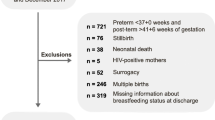Abstract
Objectives
To study the factors influencing the duration of exclusive breastfeeding (EBF) in preterm (≤34 weeks) infants.
Methods
This study was done in 113 preterm infants with gestational age ≤34 weeks who were attending the well-baby clinic at the corrected age (CA) of 6 month. The birth details were noted from hospital records and feeding details were collected through a personal interview.
Results
The mean (SD) duration of EBF was 3.61 (2.3) months, and 35.3% babies had received EBF till CA of 6 month. Operative delivery [aOR (95% CI): 3.8 (1.0, 13.4) P=0.037], delay in initiating tube feeding, [aOR; 1.5 (1.0, 2.1); P=0.017], and delay in establishment of oral feeds [aOR1 (1.0, 1.08) P=0.016] were associated with a shorter duration of EBF.
Conclusion
The prevalence of EBF till 6 months CA in preterm ≤34 weeks was 35.3%. Earlier initiation and establishment of full oral feeds may help in improving the duration of EBF.
Similar content being viewed by others
References
International Institute for Population Sciences (IIPS) and ICF. 2017. National Family Health Survey (NFHS-4), India, 2015–16: Tamil Nadu. IIPS.
National Health Portal, Government of India. 2016. Accessed May 01, 2022. Available from: https://www.nhp.gov.in/disease/reproductive-system/female-gynaecological-diseases-/preterm-birth
World Health Organization. Nutrition topics: Breastfeeding. 2018. Accessed May 01, 2022. Available from: https://apps.who.int/nutrition/topics/exclusivebreasfeeding/en/index.html
Complementary feeding: World Health Organization. 2021. Accessed October 21, 2021. Available from: https://www.who.int/health-topics/complementary-feeding#tab=tab_1
Monteiro ATA, Rossetto EG, Pereira KO, et al. Exclusive breastfeeding in preterm infants at child-friendly hospitals: a comparative study. Online Braz J Nurs. 2018;16:319–30.
Ericson J, Flacking R, Hellström-Westas L, Eriksson M. Changes in the prevalence of breast feeding in preterm infants discharged from neonatal units: a register study over 10 years. BMJ Open. 2016;6:e012900.
Cato K, Sylven SM, Henriksson HW, Rubertsson C. Breastfeeding as a balancing act — pregnant Swedish women’s voices on breastfeeding. International Breast-feeding Journal. 2020;15:16.
Lima APE, Correa T, Leal LP, et al. Exclusive breastfeeding of premature infants and reasons for discontinuation in the first month after hospital discharge. Rev. Gaucho Enferm. 2019;40:e20180406.
Ratnayake HE, Rowel D. Prevalence of exclusive breastfeeding and barriers for its continuation up to six months in Kandy district, Sri Lanka. International Breastfeeding Journal. 2018;13:36.
Yaqub A, Gul S. Reasons for failure of exclusive breastfeeding in children less than six months of age. J Ayub Med Coll Abbottabad. 2013;25:165–7.
Rodrigues C, Teixeira R, Fonseca MJ, Zeitlin J, Barros H; Portuguese EPICE (Effective Perinatal Intensive Care in Europe) Network. Prevalence and duration of breast milk feeding in very preterm infants: A 3-year follow-up study and a systematic literature review. Paediatr Perinat Epidemiol. 2018;32:237–46.
Nishimura H, Krupp K, Gowda S, et al. Determinants of exclusive breastfeeding in rural South India. International Breastfeeding Journal. 2018;13:40.
Degaga GT, Sendo EG, Tesfaye T. Prevalence of exclusive breast milk feeding at discharge and associated factors among preterm neonates admitted to a neonatal intensive care unit in public hospitals, Addis Ababa, Ethiopia: A Cross-Sectional Study. Pediatric Health Med Ther. 2020;11:21–28.
Bhanderi DJ, Pandya YP, Sharma DB. Barriers to exclusive breastfeeding in rural community of central Gujarat, India. J Family Med Prim Care. 2019;8:54–61.
Radhakrishnan S, Balamuruga SS. Prevalence of exclusive breastfeeding practices among rural women in Tamil Nadu. International Journal of Health & Allied Sciences. 2012; 1:64–7.
Funding
Funding: Doctoral Fellowship from SRIHER (PVR).
Author information
Authors and Affiliations
Contributions
Contributors: AK: data collection, statistical analysis, manuscript writing; PVR: study concept and design, supervision of data collection, data interpretation, statistical analysis, editing manuscript. Both authors have approved the final version of manuscript and are accountable for all aspects related to the study.
Corresponding author
Ethics declarations
Ethics clearance: Research and Ethics Committee, SRIHER (DU); No. NI/19/JUL/70/60, dated Dec 27, 2019.
Competing interests: None stated.
Rights and permissions
About this article
Cite this article
Kutar, A., Ramanan, P.V. Factor Affecting Duration of Exclusive Breast Feeding in Preterm Infants With Gestational Age ≤ 34 Weeks. Indian Pediatr 59, 703–706 (2022). https://doi.org/10.1007/s13312-022-2598-y
Received:
Revised:
Accepted:
Published:
Issue Date:
DOI: https://doi.org/10.1007/s13312-022-2598-y




